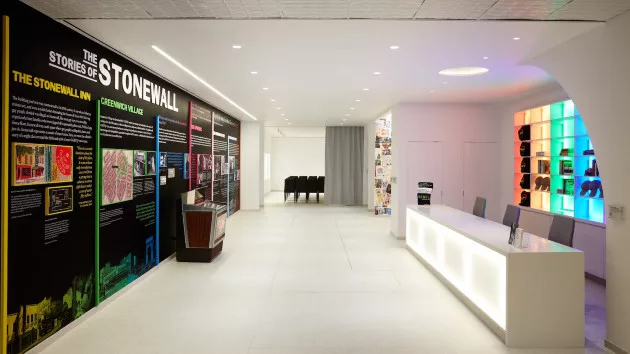(NEW YORK) — Mark Segal was 18 years old and had only lived in New York City for six weeks when he found himself at the center of the Stonewall Uprising in 1969.
The very spot where Segal once danced, drank and took part in one of the most consequential moments in LGBTQ history is now the first LGBTQ visitor center within the National Park System.
“Before Stonewall, there were no more than 100 out activists in the entire United States of America on that first Pride,” said Segal, now 73. “Today, if you look around the world, there are millions of people who celebrate Pride. And it all started in that building.”
The Stonewall National Monument Visitor Center, which opened to the public Friday, is what Segal would have hoped for over 55 years ago as a Stonewall veteran.
“If we are visible, that creates dialogue. Dialogue creates education, education creates equality,” said Segal.
The Stonewall Uprising on June 28, 1969, began in response to a routine police raid on a gay bar, according to the Library of Congress.
Segal recalls the lights in the bar blinking on and off — signifying the arrival of the police who would typically “come in, take some money and leave.” But that’s not what he says happened that night.
“The police burst through the doors, started breaking up the bar, started throwing liquor bottles around, took people and threw them up against the wall — screamed, shouted, it was the most violent thing I’ve ever seen in my life,” said Segal.
Patrons responded by fighting back, entrapping the police in the bar: “We were in an uprising against those who oppressed us. For the first time in history, the people that are always incarcerating us, we were now incarcerating them,” Segal said.
Before the 1960s, living openly as a lesbian, gay, bisexual, transgender, or queer person was largely illegal, according to the National Park Service.
“At that time, we as a community were totally invisible,” said Segal. “LGBT people were not in newspapers, were not in magazines, were not radio, not in television.”
NYPD officials have since apologized for past anti-LGBTQ practices and the raid of Stonewall.
The Stonewall Inn, as it stands today, only holds a part of where the original bar once stood. The visitor’s center is now housed in the other half of the original bar — reclaiming the dark LGBTQ history of the location.
“The power of place can be felt walking through the Greenwich Village streets where people stood up and spoke out, paving the way for equality for all,” said Theresa Pierno, president and CEO for the National Parks Conservation Association, in a recent statement. “When you explore the new visitor center, you’re learning from and honoring those courageous people. Stonewall will continue to inspire for generations and we’re proud to work to help ensure our national parks include diverse, inclusive stories that welcome and represent the people that shaped our nation.”
The bar became a national monument in 2016 under the Obama administration. Shortly after, LGBTQ advocacy group PrideLive secured the lease to the long vacant 51 Christopher Street part of the historic location and transformed it into the center it is today.
The center – organized by two queer women of color, PrideLive’s Diana Rodriguez and Ann Marie Gothard – hopes to serve as a living monument to those who have shaped the LGBTQ equality movement.
It has visual art displays and a dedicated theater space, with the hopes of growing even larger to tell more Stonewall stories. Segal in particular hopes to see further discussions about the intersectionality of the LGBTQ liberation movement and its connections to other movements for equality and civil rights.
“We’re intertwined with history, but people have made us invisible,” said Segal.
He said he’s seen backlash against the community throughout his lifetime whenever there is progress. This latest rise in anti-LGBTQ sentiment in the U.S. — particularly anti-transgender sentiment — is not shocking to him.
“We’re not going to be invisible ever again,” he added.
The center’s jukebox, the same model as the one that was previously housed in the original Stonewall Inn, plays the same songs that would have been played at the time. It gives Segal chills.
“I’ll stand back and I’ll close my eyes and I will almost dream of myself being back there,” said Segal.
He continued, “Please don’t be mournful. Be cheerful, because what happened [in the LGBTQ equality movement] got us to where we are today. So we should be somewhat celebratory. I know some of us didn’t make it. But we’re in a better place thanks to those people.”
Copyright © 2024, ABC Audio. All rights reserved.

